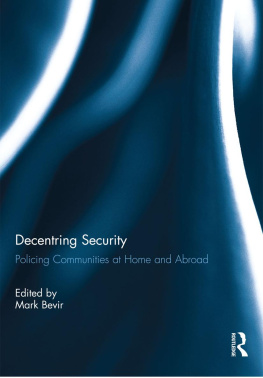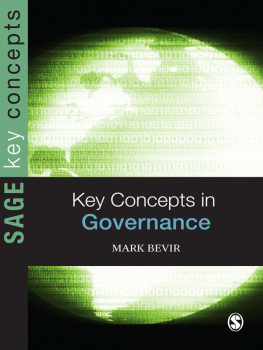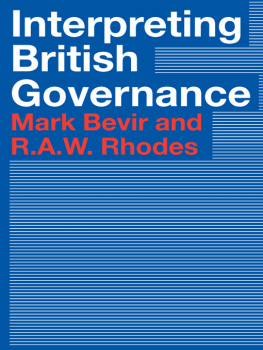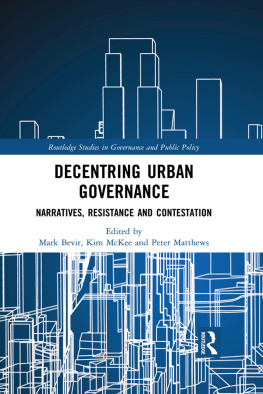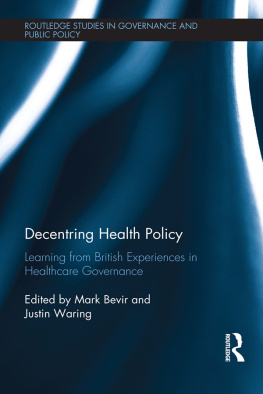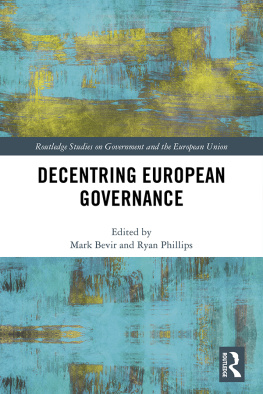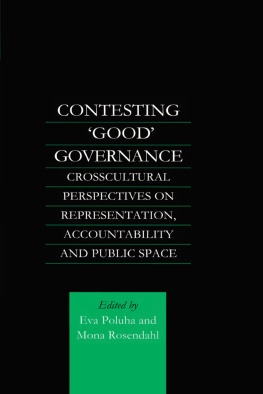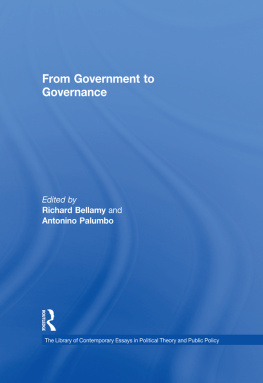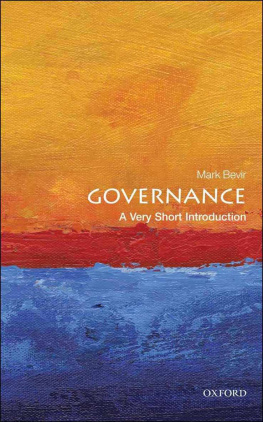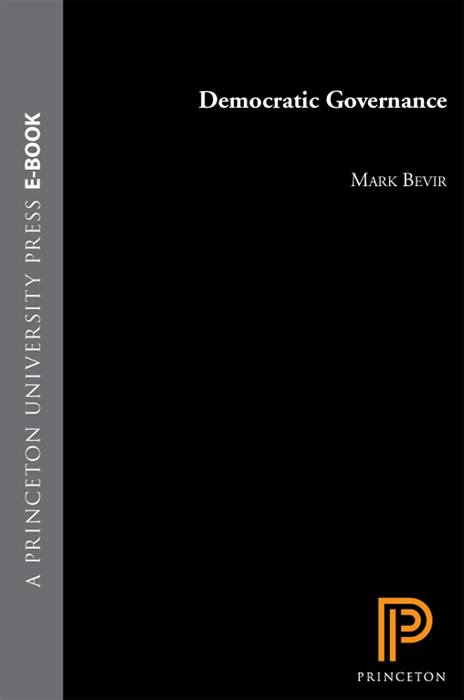Democratic Governance
Democratic Governance
Mark Bevir
princeton university press
princeton and oxford
Copyright 2010 by Princeton University Press
Requests for permission to reproduce material from this work
should be sent to Permissions, Princeton University Press
Published by Princeton University Press, 41 William Street,
Princeton, New Jersey 08540
In the United Kingdom: Princeton University Press, 6 Oxford Street,
Woodstock, Oxfordshire OX20 1TW
All Rights Reserved
Library of Congress Cataloging-in-Publication Data
Bevir, Mark.
Democratic governance / Mark Bevir.
p. cm.
Includes bibliographical references and index.
ISBN 978-0-691-14538-9 (hardcover : alk. paper)
ISBN 978-0-691-14539-6 (pbk. : alk. paper)
1. Democracy. 2. Public administration. 3. State, The. I. Title.
JC423.B428 2010 321.8dc22
2009052058
British Library Cataloging-in-Publication Data is available
This book has been composed in Sabon
Printed on acid-free paper.
press.princeton.edu
Printed in the United States of America
10 9 8 7 6 5 4 3 2 1
To Harry
Contents
Chapter One
Interpreting Governance 1
Part I: The New Governance 15
Chapter Two
The Modern State 17
Chapter Three
New Theories 39
Chapter Four
New Worlds 65
Part II: Constitutionalism 93
Chapter Five
Democratic Governance 95
Chapter Six
Constitutional Reform 122
Chapter Seven
Judicial Reform 147
Part III: Public Administration 175
Chapter Eight
Public Policy 177
Chapter Nine
Joined-up Governance 199
Chapter Ten
Police Reform 227
Conclusion
After Modernism 251
Contents
Tables
2.1 The Rise and Varieties of Modernism 19
3.1 Theories of Governance 41
5.1 The New Public Service 103
5.2 Rethinking Democracy 105
6.1 Constitutional Statutes under New Labour 132
7.1 From Dicey to New Labour 148
8.1 Rethinking Public Policy 179
10.1 Narratives of Police Reform 230
11.1 After Modernism 258
Preface
Democratic Governance offers a genealogy of some problems confronting democracy. The genealogy focuses on modernist social science. Modernism has transformed our political practices. New theories of governance have contributed to the rise of new worlds of governance. The new governance challenges democracy. Policy makers have ignored the challenge, or responded to it in terms set by the theories that caused it. Democratic action has lost out to scientific expertise.
While the new theories of governance have roots in the late nineteenth and early twentieth centuries, the new worlds of governance did not appear much before the 1980s. I do not mention the 1980s to support the glib identification of governance with a reified, uniform, and unchanging set of neoliberal policies: the new worlds of governance have always been diverse and contested, and even when governments did adopt neoliberal policies, the policies rarely worked as intended so they have been replaced or supplemented with alternative policies. Instead, I mention the 1980s to suggest the new worlds of governance have coincided with my adult lifetime. When I have written on governance, I have narrated my times.
My narratives are my political action. When we describe the new worlds of governance and explain how they arose, we necessarily approve or critique the ideas embedded in those worlds. Our stories can challenge current ways of acting and suggest alternative possibilities. New stories do not create new practices, but they can prepare the way for them. I tell stories because I have little talent or taste for other forms of political action.
Acknowledgments
I thank Ben Krupicka, Rod Rhodes, and Frank Trentmann for discussions and collaborations on governance. Sage, Elsevier, and Oxford University Press kindly allowed me to draw on previously published essays: the introductions to M. Bevir, ed., Public Governance (Sage, 2007); Police Reform, Governance, and Democracy, in M. ONeil, M. Marks, and A-M. Singh, eds., Police Occupational Culture: New Debates and Directions (Elsevier, 2007); and The Westminster Model, Governance, and Judicial Reform, Parliamentary Affairs 61 (2008): 55977. Ian Malcolm of Princeton University Press has been an intelligent and supportive editor. Laura once again did the index, and once again the index is the least of the many things she does for which I am so very grateful.
Abbreviations
AMS additional member system
COPS Community Orientated Policing Services
CRA Constitutional Reform Act
DBERR Department of Business, Enterprise, and Regulatory
Reform
DHS Department of Homeland Security
DIUS Department for Innovation, Universities, and Skills
ECHR European Court of Human Rights
ECJ European Court of Justice
EU European Union
GLA Greater London Authority
HRA Human Rights Act
MBO management by objectives
MBR management by results
NHS National Health Service
NPM new public management
NRM natural resource management
OECD Organisation for Economic Co-operation and
Development
PMCA Police and Magistrates Courts Act
PSA public service agreement
STV single transferable vote
TQM total quality management
Democratic Governance
Chapter one
Interpreting Governance
Once you start to listen out for the word governance, it crops up everywhere. The Internet faces issues of Internet governance. International organizations promote good governance. Hospitals are introducing systems of clinical governance. Climate change and avian flu require innovative forms of global and transnational governance. Newspapers report scandalous failures of corporate governance.
Unfortunately, the ubiquity of the word governance does not make its meaning any clearer. A lack of clarity about the meaning of governance might engender skepticism about its importance. The lack of clarity lends piquancy to questions such as: How does the concept of governance differ from that of government? Why has the concept of governance become ubiquitous? What is the relationship of governance to democracy? How do policy actors respond to the challenges of governance?
This book attempts to answer these questions. It argues that:
The concept of governance evokes a more pluralistic pattern of rule than does government: governance is less focused on state institutions, and more focused on the processes and interactions that tie the state to civil society.
The concept of governance has spread because new theories of politics and public sector reforms inspired by these theories have led to a crisis of faith in the state.
Governance and the crisis of faith in the state make our image of representative democracy implausible.
Policy actors have responded to the challenge of governance in ways that are constrained by the image of representative democracy and a faith in policy expertise.
While these arguments might seem straightforward, we will confront a host of complexities along the way. These complexities often reflect
the limited extent to which we can expect concepts such as governance
to have fixed content. Governance is a vague and contested term, as
are many political concepts. People hold different theories and values that lead them, quite reasonably, to ascribe different content to the
concept of governance. There are, in other words, multiple theories and multiple worlds of governance, each of which has different implications for democracy.


